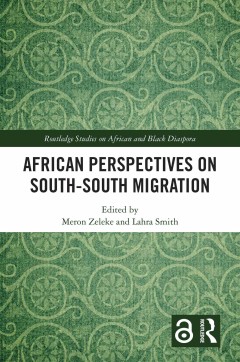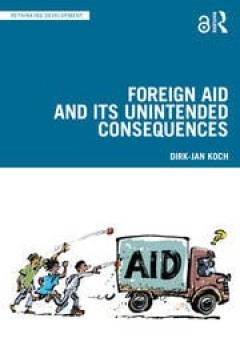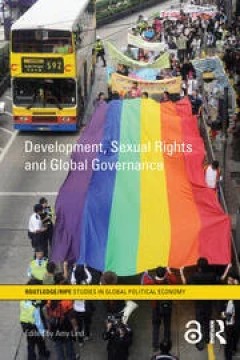Filter by

African perspectives on South-South migration
This book investigates the diverse and dynamic forms of migration within Africa. Centring themes of agency, resource flows, and transnational networks, the book examines the enduring appeal of the Global South as a place of origin, transit, and destination. Popular media, government pronouncements, and much of the global research discourse continue to be oriented towards migration from the G…
- Edition
- -
- ISBN/ISSN
- 9781003368267
- Collation
- -
- Series Title
- -
- Call Number
- -

Foreign Aid and its Unintended Consequences
Foreign aid and international development frequently bring with it a range of unintended consequences, both negative and positive. This book delves into these consequences, providing a fresh and comprehensive guide to understanding and addressing them. The book starts by laying out a theoretical framework based on complexity thinking, before going on to explore the ten most prevalent kinds o…
- Edition
- 1st Edition
- ISBN/ISSN
- 9781003356851
- Collation
- 236
- Series Title
- -
- Call Number
- -

Development, Sexual Rights and Global Governance
This book addresses how sexual practices and identities are imagined and regulated through development discourses and within institutions of global governance. The underlying premise of this volume is that the global development industry plays a central role in constructing people’s sexual lives, access to citizenship, and struggles for livelihood. Despite the industry’s persistent insis…
- Edition
- 1st Edition
- ISBN/ISSN
- 9780203868348
- Collation
- p. 240
- Series Title
- -
- Call Number
- -

Environmental change in South-East Asia: people, politics and sustainable dev…
Environmental Change in South-East Asia brings together scholars, journalists, consultants and NGO activists to explore the interaction of people, politics and ecology. Ostensibly "green" activities - plantation forestry, eco-tourism, hydro-electricity - are revealed as guises used by elites to promote their own political and economic interests. Highlighting fatal flaws in presently exclusive …
- Edition
- 1st Edition
- ISBN/ISSN
- 9780203983003
- Collation
- -
- Series Title
- -
- Call Number
- -

Revolutionizing Development Reflections on the Work of Robert Chambers
This book tells the story of development studies in practice over the last fifty years through the work of one remarkable individual, Robert Chambers. His work has taken him from being a colonial officer in Kenya through training and managing large rural development projects to a fundamental critique of top-down development and the championing of participatory approaches. The contributors eloqu…
- Edition
- -
- ISBN/ISSN
- 9781003298632
- Collation
- -
- Series Title
- -
- Call Number
- -

State Fragility Case Studies and Comparisons
Presenting case studies and comparisons across seven countries, this book addresses key questions as to the nature of state fragility, policies used to mitigate it, assessment of outcomes and prospects. It offers a novel empirical contribution in examining a range of distinct but interdependent dimensions of state fragility, not only focusing on questions of state legitimacy, capacity and au…
- Edition
- -
- ISBN/ISSN
- 9781003297697
- Collation
- -
- Series Title
- -
- Call Number
- -

Sustainable Food Futures: Multidisciplinary Solutions
Securing sustainable food for everyone is one of the world's most pressing challenges, but research, policy, and programmes remain fragmented, and effective solutions have been slow to emerge. This book takes on these challenges by proposing a range of solutions that can advance pathways towards sustainable food futures. Complete with recipes, this book is structured so that readers are taken …
- Edition
- -
- ISBN/ISSN
- -
- Collation
- -
- Series Title
- -
- Call Number
- -

EU Cohesion Policy: Reassessing performance and direction
This book brings together academics, members of European institutions, and regional and national level policymakers in order to assess the performance and direction of EU Cohesion policy against the background of the most significant reforms to the policy in a generation. Responding to past criticisms of the effectiveness of the policy, the policy changes introduced in 2013 have aligned Europea…
- Edition
- -
- ISBN/ISSN
- 9781315401867
- Collation
- -
- Series Title
- -
- Call Number
- -

Nigeria's Third-Generation Literature
This book considers the evolution and characteristics of Nigeria’s third-generation literature, which emerged between the late 1980s and the early 1990s and is marked by expressive modes and concerns distinctly different from those of the preceding era. The creative writing of this period reflects new sensibilities and anxieties about Nigeria’s changing fortunes in the post-colonial era.…
- Edition
- -
- ISBN/ISSN
- 9781003290186
- Collation
- -
- Series Title
- -
- Call Number
- -

Communities and Museums in the 21st Century
Communities and Museums in the 21st Century brings together innovative, multidisciplinary perspectives on contemporary museology and participatory museum practice that contribute to wider debates on museum communities, heritage, and sustainability. Set within the context of globalisation and decolonisation, this book draws upon bi-regional research that will enrich our understanding of the c…
- Edition
- -
- ISBN/ISSN
- 9781003288138
- Collation
- -
- Series Title
- -
- Call Number
- -
 Computer Science, Information & General Works
Computer Science, Information & General Works  Philosophy & Psychology
Philosophy & Psychology  Religion
Religion  Social Sciences
Social Sciences  Language
Language  Pure Science
Pure Science  Applied Sciences
Applied Sciences  Art & Recreation
Art & Recreation  Literature
Literature  History & Geography
History & Geography